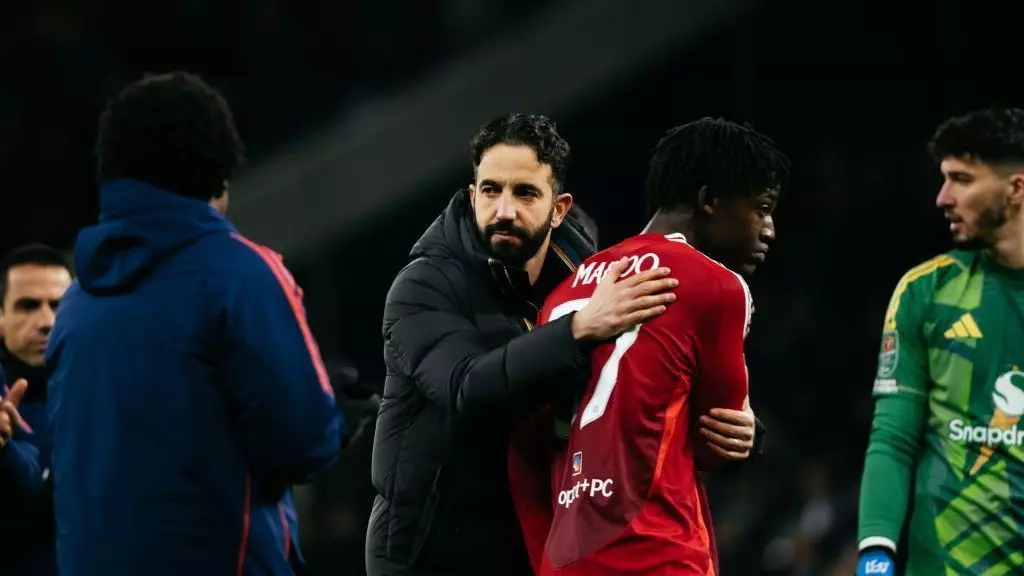The football world is rife with controversies, but few are as contentious as coaching decisions, especially in high-stakes situations. Recently, Manchester United’s head coach, Ruben Amorim, faced scrutiny for his decision to exclude star winger Marcus Rashford from the squad for two consecutive matches, including a pivotal Carabao Cup quarterfinal clash against Tottenham Hotspur. Despite a thrilling contest that ended in a nail-biting 4-3 defeat, Amorim stood resolute, defending his controversial choice that left fans and analysts questioning the implications on both Rashford’s future and the club’s current trajectory.
During an interview following the match, Rashford expressed dissatisfaction with his situation, hinting at a desire to leave Old Trafford. This revelation adds an additional layer of complexity to an already tense situation—as a prominent player, his potential exit could destabilize United’s squad dynamics. Amorim, however, remained firm in his convictions. He articulated that selections for the team are made with the best interests of the club in mind, insisting, “It’s never a mistake,” despite the backlash that followed.
The game itself was a rollercoaster ride of emotions. United, despite Rashford’s absence, showed remarkable resilience after falling behind 3-0. They fought back to reduce the deficit to 3-2, thanks in part to some uncharacteristic blunders from Tottenham’s goalkeeper, Fraser Forster. This recovery speaks volumes about United’s potential when they manage to rally as a team. However, the momentary lapse that allowed Spurs to net two quick goals post-halftime proved decisive. Amorim lamented this eight-minute stretch, emphasizing how crucial it is to maintain focus throughout the match.
In retrospect, it was not only a night filled with dramatic narratives but also one plagued by goalkeeping errors—Altay Bayindir’s inclusion as United’s starting goalkeeper over Andre Onana resulted in crucial mistakes that compounded the team’s misfortunes. Amorim must grapple with the repercussions of entrusting a less-experienced keeper in such a high-pressure situation, particularly against a strong opponent like Tottenham.
Forster’s shortcomings stood out, amplified by his blunders, leading to criticism and disappointment from his manager, Ange Postecoglou. The Tottenham coach defended Forster’s track record, highlighting his earlier contributions during the match while acknowledging the mental toll that errors can take on a goalkeeper. Here lies a crucial point: a goalkeeper’s performance can fluctuate under the weight of expectation, and when confidence wanes, the repercussions can echo throughout the entire squad.
Such volatility raises questions about both United and Tottenham’s habit of relying on individual brilliance over cohesive team strategies. With Amorim advocating for a team-first ethos despite the absence of key players, the challenge lies in maintaining that philosophy when top talents like Rashford express discontent.
Looking ahead, United must navigate through the immediate aftermath of this loss, while also contemplating the potential ramifications of Rashford’s expressed desire to leave. How do they reconcile a crucial player’s needs with the overall vision laid out by their coach? The decisions made in the coming weeks could redefine the club’s identity going forward.
As Tottenham prepares for their semifinal clash against Liverpool, United’s aim stays focused on recuperating from this disappointment. The club’s future relies not only on tactical rigour but also on effective man-management. Balancing player egos, making calculated choices, and fostering a united team spirit will ultimately dictate whether Amorim’s decisions will be vindicated or, conversely, become points of contention that haunt the club.
The episode serves as a stark reminder of the inherent unpredictability of football, where one decision can shift the trajectory of a season or even a career. The test for Amorim will be to navigate these turbulent waters while keeping Manchester United’s aspirations alive amid its growing internal conflicts.

